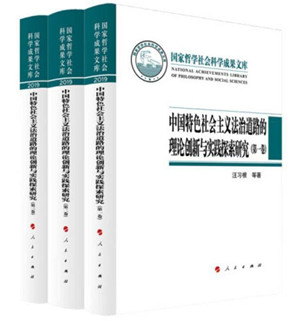
. > WHAT'S NEW > BOOKS
A path of socialist rule of law with Chinese charateristics
Author : TANG YONG Source : Chinese Social Sciences Today 2023-07-06

Theoretical Innovation and Practical Explorations for a Path of Socialist Rule of Law with Chinese Characteristics
Theoretical Innovation and Practical Explorations for a Path of Socialist Rule of Law with Chinese Characteristics, by Wang Xigen, dean of the Law School at Huazhong University of Science and Technology, et al., gives an in-depth interpretation on the subject under the guidance of Xi Jinping Thought on Socialism with Chinese Characteristics for a New Era, based on the “11 upholds” of Xi Jinping Thought on the Rule of Law. It concentrates on the strategic deployment of law-based governance on all fronts since the 18th National Congress of the CPC, revealing the jurisprudential basis, scientific connotations, value orientations, strategic conception, and practical solutions of the path of socialist rule of law with Chinese characteristics.
Strengthening the leadership of the Party is the first core tenet of following this path, while the second entails upholding the system of socialism with Chinese characteristics. The authors clarify the compatibility of the rule of law and socialism. Specifically, they extract practical experiences from the people’s congress system, political party and economic systems, regional ethnic autonomy, and community-level self-governance, providing theoretical guidance for maximally unleashing the value function of rule of law in the socialist system.
The theory of socialist rule of law with Chinese characteristics represents the third tenet. The book elaborates upon the innovation and transcendence of the theory in the new era over traditional ones from the perspectives of good law and good governance, legal authority, guarantee of rights, restriction of power, social fairness, judicial justice, belief in the rule of law, as well as the thinking, reform, and discourse of the rule of law.
The path of socialist rule of law with Chinese characteristics does not emerge and develop out of a void. Its conceptual germination dates from the founding of the CPC in 1921, while practical explorations began during the Land Revolution period (1927–37). The social background, intellectual basis, major contents, and features varied across different historical stages.
The book divides the path’s development into four periods—explorations during the New Democratic Revolution (1919–49); tortuous developments during the early years following the founding of the PRC in 1949 and socialist construction; building up during the first 20 years after reform and opening up; and formation since the 15th, and particularly the 18th National Congress of the CPC.
The authors also proceed from an international perspective to facilitate mutual reference, showcasing the natural evolution of British rule of law, pertinent achievements and puzzles of the United States, experiences provided by France’s top-down orientations and Singapore’s pragmatic model, hindrances to Japan’s introducing Western concepts, and practical dilemmas resulting from South Korea’s constitutional structures.
Tang Yong is a professor from the Law School at Zhejiang University of Finance and Economics.
Ye Shengtao made Chinese fairy tales from a wilderness
Ye Shengtao (1894–1988) created the first collection of fairy tales in the history of Chinese children’s literature...
-
How northern ethnicities integrated into Chinese nation
2023-09-18
-
Mogao caves
2023-09-12
-
Mogao Grottoes as ‘a place of pilgrimage’
2023-09-12
-
Time-honored architectural traditions in China
2023-08-29
-
Disentangling the civilizational evolution of China
2023-08-28
-
AI ethics in science fiction
2023-08-23













 2011-2013 by www.cssn.cn. All Rights Reserved
2011-2013 by www.cssn.cn. All Rights Reserved